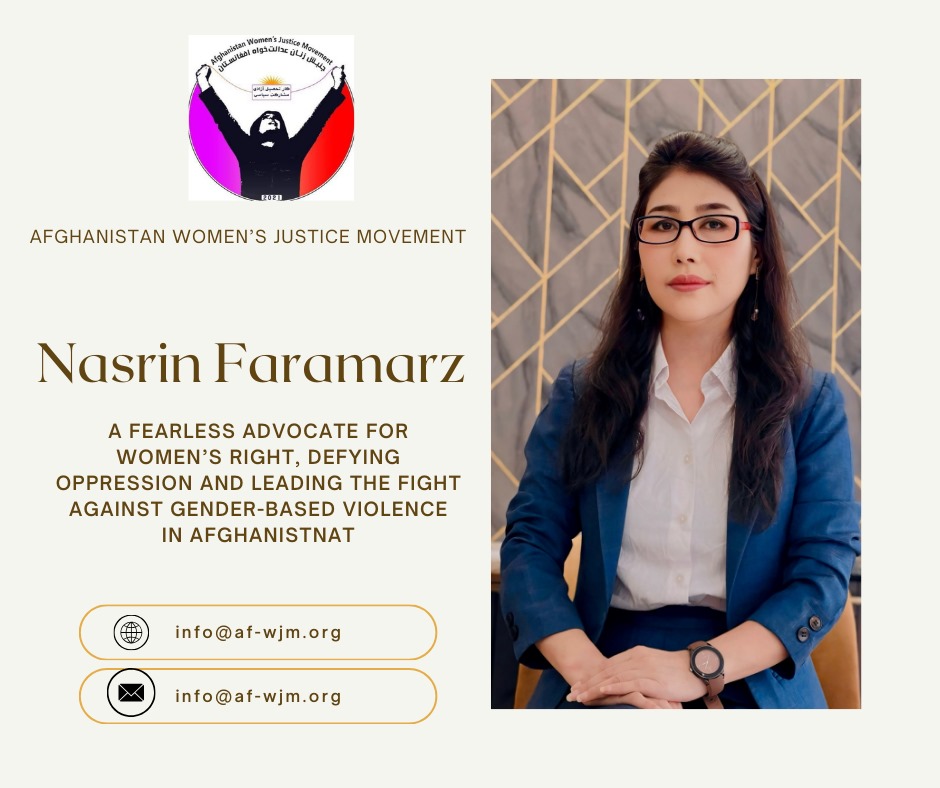
Nasrin Faramarz, born in 1988 in Ghazni province, Afghanistan, has been a steadfast advocate for justice and equality from the earliest stages of her academic journey. After excelling in the National University Entrance Examination (Kankor), she pursued her undergraduate studies at Balkh State University. In 2017, she earned a Master’s degree in Criminal Law and Criminology from Ibn Sina University. During her studies, she worked closely with the Legal Clinic of Balkh University, gaining invaluable experience in legal awareness and empowerment programs for women.
Nasrin is recognized as the first Afghan female researcher to explore the intersections of international criminal law and women’s rights within both the international and Afghan legal frameworks. Her master’s thesis, titled “Crimes Against Women in International Criminal Law and Afghan Legislation,” reflects her deep and critical engagement with justice systems and the rights of women under conditions of conflict and patriarchy.
Following her graduation, Nasrin began her academic career as a lecturer at Rabia Balkhi Private University, where for three years she taught foundational legal subjects—including General Criminal Law, Specific Criminal Law, and Principles of Law—at both the central and Barchi branches of the university. She also received professional training and worked with the international organization Global Rights, where she contributed to the department handling civil cases.
When the Taliban returned to power on August 15, 2021, and launched a brutal crackdown on the rights of women and girls, Nasrin responded with unwavering courage. Just two days later, on August 17, 2021, she joined the front lines of resistance. Over the course of the next two years, until August 2023, she emerged as a leading figure in organizing and participating in street protests and underground gatherings across multiple provinces. Her fearless leadership and activism echoed powerfully across both national and international media platforms.
Faced with relentless threats and surveillance by the Taliban’s intelligence apparatus, Nasrin was forced into hiding for ten months, living in displacement across various provinces of Afghanistan. In June 2024, she successfully escaped the country.
As of May 9, 2025, Nasrin Faramarz serves as a core leader of the Afghanistan’s Women Justice Movement—a powerful grassroots force confronting gender apartheid, patriarchal violence, and systemic oppression. Through her relentless advocacy, she continues to challenge gender-based violence perpetrated by the Taliban, as well as the deep-rooted traditions of honor-based control and the objectification of women in Afghan society. Her voice remains a beacon of hope and defiance for Afghan women, both inside the country and across the diaspora.

Nasrin Faramarz: From Resisting the Taliban to Seeking Refuge in a Land of Hope – The Story of an Unyielding Advocate for Justice and Women’s Rights
Hamia Naderi (b. 1992, Badakhshan) is an Afghan journalist and human rights activist, recognized as a fearless voice for women’s rights and social justice. With over a decade of experience, she has documented migration, exposed Taliban gender apartheid, and amplified silenced Afghan women. A journalism graduate of Badakhshan State University, she has worked with multiple Afghan and regional outlets since 2015 and earned recognition for her bold, investigative reporting. Today, as a member of the Federation of Afghan Journalists in Exile and the Afghanistan Women’s Justice Movement, she continues to inspire and mobilize for change.
Leave a Comment



